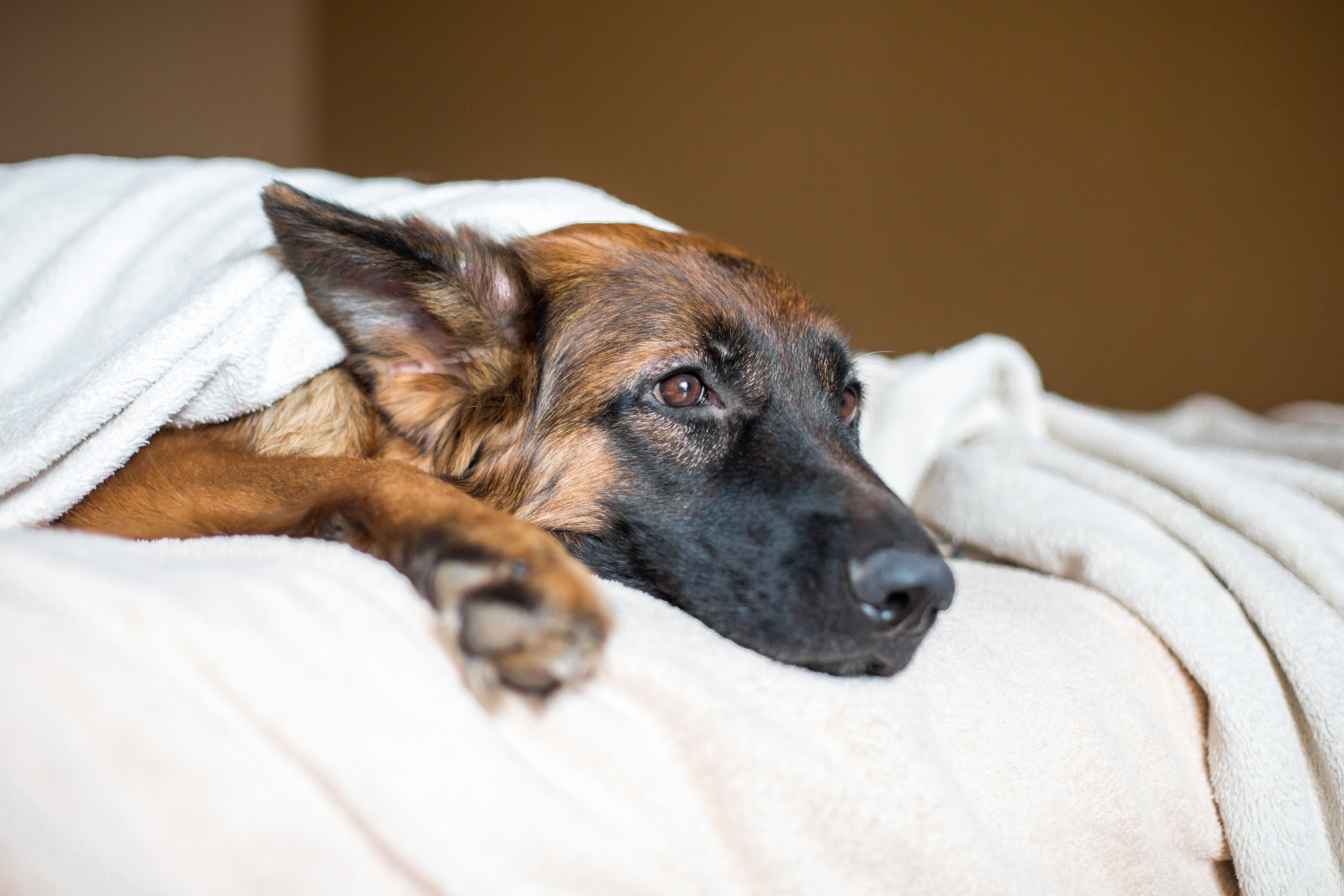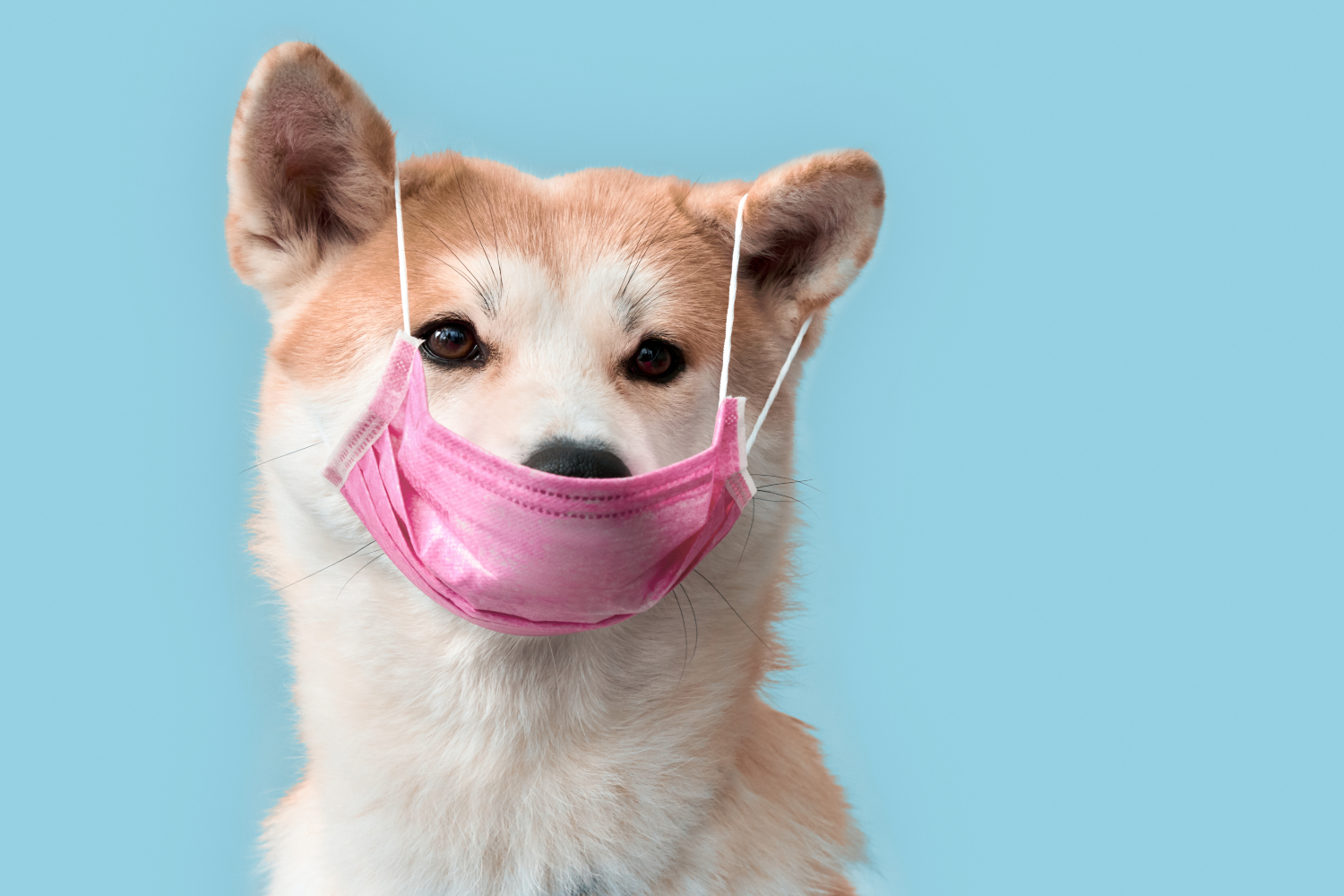
Does my dog have a cold?
20th January, 2023
Has your elderly hound got a case of the sniffles? Are they a little less energetic than usual? Your senior dog might have a cold! Discover how to spot the signs and nurse your sickly pooch back to health.
Is there anything better than a doggy cuddle when you’re feeling under the weather? A runny nose, croaky throat, and the dreaded body aches are enough to put anyone out of action for a while, and who better to share those sickly sofa days with than your faithful friend.
They don’t care about your snotty nose or feverish sweats – it’s unconditional love at its finest! But what about when your canine companion gets struck with the dreaded lurgy?
Your doggy’s symptoms might not be as obvious as yours, but you’d feel awful if you couldn’t spot the signs in your poorly pooch.
Fear not! We’ve got you covered and are here to help you kick that cold into touch with some top tips to get your dog back to its best.
We also share why senior dog insurance in the UK is important to protect your loyal companion as they enter their golden years.
So, what exactly is a dog cold?
We’re all familiar with the awful feelings that come with a cold – it’s no fun, right? You feel like doing nothing at all except snuggling under a cosy blanket and catching up on your favourite TV series.
But before you start picturing your faithful friend lounging on the sofa with a mug of lemon and honey on the go, let’s define what a doggy cold means.
Unlike us humans, who get the fearful flu from the influenza virus, canines rarely suffer from the dog version.
In fact, it’s impossible for you to pass on a cold to your ageing hound, so there’s no need to hibernate in your room when it’s just you and them at home.
So, can your four-legged friend even succumb to an illness resembling a horrible human cold? According to Animal Trust, they might be at risk of canine parainfluenza virus.
What’s that, you ask?
Just like a cold or the flu, it’s an airborne disease that’s spread by tiny droplets in the air. Your poor pooch can pick it up on infected bedding, food bowls, and if they spend time at kennels – hence the name ‘kennel cough’. Sounding more familiar?
Just to be clear, canine parainfluenza virus is only one of the causes of kennel cough – a respiratory infection that manifests thanks to a whole host of viruses and bacteria.
Poorly pets develop a range of symptoms like we do, but they sometimes make it harder to spot. Don’t worry, though, we’re going to tell you exactly what to watch out for below so you can act fast.
Spotting the signs early on is especially important in older dogs, as they don’t bounce back to their best as fast as they once did.
It’s a good idea to protect your four-legged family member’s health with senior dog insurance in the UK to help with those unexpected vet bills in case of an emergency.
Does kennel cough do long lasting damage?
Not usually. Many dogs will experience a bout or two of kennel cough in their lifetime and the condition usually improves by itself in a couple of weeks.
The only time you really need to worry about your pet is if they are old or if they already suffer from a respiratory problem with their lungs or heart. Always take your senior pooch to the vet for advice on how to manage their illness and prevent any serious damage being done.
Got a policy with Petwise? Jump on a vet video call 24/7 to get the answers you need.
How to tell if your senior dog is suffering with a cold
Every pet parent wants to know what their dog is thinking, right? If only they could talk! We bet those senior pets have a lot of stories to tell!
Unfortunately, a few barks is as good as it gets, so understanding your dog’s body language and looking out for signs that they’re poorly is the best way to know when they are feeling under the weather.
Your canine companion relies on you for just about everything, and that means looking out for their health.
Luckily, kennel cough and other respiratory illnesses aren’t too difficult to spot, and there are a few flu-like symptoms that are a giveaway they are suffering.
If you notice any of these signs, it’s time to take Fido to the vet:
- Runny nose
- Sneezing
- A harsh, dry or honking cough
- Watery eyes
- Conjunctivitis
- Generally lethargic and not as active as usual
- Wheezing and difficulty breathing
- Eating less than normal
- Fever
While it’s easy for us as people, to pop a couple of paracetamol and lather on the vapour , it’s more appropriate and a better idea for us to take our senior dog to the vet just to check there’s nothing more serious going on.
It might just be a virus that will pass in a day or two or it could be something scary like pneumonia, which is where your senior dog insurance in the UK could kick in.
How to treat a dog with a cold
You spotted the signs and whisked your old dog off to the vet – that’s some responsible pet parenting right there! And now, after years of being your loyal sidekick and looking out for you, your elderly four-legged family member is relying on you to help them get better.
Don’t worry – you don’t need a vet’s degree to nurse a cold-ridden pooch back to health. If your vet diagnosed your dog with kennel cough or the canine parainfluenza virus, you’ll need to:
- Keep your dog separate from other pets in a safe and well-ventilated part of the house.
- Give them access to fresh drinking water in a metal bowl. Plastic bowls can crack and become breeding grounds for bacteria. Make sure you clean the bowl regularly.
- Keep your dog away from things that might make them bark and strain their throat. This could make their cough worse.
- Keep up with the medication from the vet and make their bed as comfortable as you can.
Need some quick advice on caring for your beloved pooch? Use your senior dog insurance in the UK to contact our 24/7 vet video consultation service and our experts will be more than happy to help!
Can I prevent my senior dog from catching a cold?
So now you know exactly what to do if your dog catches a cold. But wouldn’t it be better to avoid the sniffles in the first place? As the old saying goes, prevention is better than cure.
The best way to protect your furry family member against kennel cough and other viruses is by staying up to date with their vaccinations.
Routine treatments like vaccines don’t come as part of your senior dog insurance in the UK, but they are an essential part of responsible pet parenting.
As canines age, they become more susceptible to all kinds of illnesses, so they need you to look out for their health now more than ever.
If you’re worried you might have fallen behind on protecting your pet, it’s not too late. Contact your vet to book an appointment and they’ll make sure your mischievous mutt leaves fully immunised.
That’s not all you can do. Keep your golden oldie fit and healthy with a well-balanced diet and plenty of exercise to make sure they are prepared to face any lurgy head on!
What else could it be?

There are actually quite a few reasons why your doggy might be sputtering and sneezing – some more serious than others. Here are a few of the most common:
Lead pulling
Although this type of behaviour isn’t quite so common in older dogs, some might still tug on the odd occasion. Pulling hard puts pressure on their windpipe, causing your four-legged friend to start hacking.
Who said you can’t teach an old dog new tricks? Not us! It’s never too late to train your senior pooch to be a good walker.
Clinical Animal Behaviourist Rosie Bescoby says that you should stop whenever the lead goes tense. This way, your dog will understand that they can only keep going when the lead is loose.
Rosie also emphasises how important it is to reward your four-legged friend whenever they check in with you or come when called to reinforce this good behaviour.
Allergies
Hate hay fever time? Your dog could be suffering, too! Luckily, it’s not too tough to control, and your vet should be able to recommend some antihistamines to get your pet through the worst days. If you also happen to own a cat, check out our blog on how to care for a cat with a fever.
Bronchitis
Ignoring viral or bacterial infections is a big no. If left untreated, your canine could develop bronchitis, which can cause them quite a lot of pain and discomfort. Do you know how to tell if your beloved hound is suffering in pain? Take a look at these common signs.
Watch your loyal companion to see if they start coughing up fluid, wheezing, losing their appetite, and appear especially sleepy.
Infections
Is your pet’s primary symptom weeping or watery eyes? If they don’t improve in a couple of days and you notice their eyes turning red, swelling up, and even closing, they might have an infection. Get them to the vet as soon as possible to avoid it getting any worse.
Choking
Have you ever seen your dog struggling to breathe between coughing fits? Sounds scary, doesn’t it?
Canines are curious creatures, and it’s not uncommon for them to swallow all sorts of weird and wonderful things by mistake. These symptoms could mean they’ve got something lodged in their airways and needs to see the vet immediately.
This is a stressful situation for any pet parent, and the last thing you want on top of this is for unexpected costs to drain your bank balance.
Our sister site, Purely Pets, has some great tips on how to stop a dog from choking.
Heart concerns
If your canine companion has something wrong with their heart, they’ll probably be breathing faster than usual and get tired more easily. Issues with their ticker can also cause a cough, but it’s not usually the most prominent symptom.
When should I take my dog to the vet?
Some of those things sound pretty scary, don’t they? But don’t worry. Canine parainfluenza and kennel cough are usually the culprits for a cough accompanied with sneezing, watery eyes, and less energy. Phew!
When a pup is young, a quick call to the vet can be enough to get some quick advice on helping them recover at home.
But as your dog ages, they’re at higher risk of more serious concerns, so it’s a good idea to get them seen by our team at FirstVet, even if you think it’s nothing major.
What should I feed my old dog?
Remember those teenage years? Wolfing down exactly what you wanted without worrying about your weight! But now you’re older, you eat one slice of pizza, and the scales start to tip.
The same goes for your elderly pooch. As dogs age, their metabolism slows down and they might exercise less than they used to, meaning they’re more likely to pile on the pounds.
Other canines might go off their food completely, which can be worrying for any parent.
A well-balanced diet helps keep your dog’s weight within the optimal range and means their immune system can work hard to fight off those nasty bugs.
So, what can you do to make sure they’re getting all the right nutrients and not wolfing down too much? Or too little? Check out these six handy hints:
- The Kennel Club recommends switching your dog’s food to one lower in calories as they get on in years. A protein-rich, high quality diet is ideal – just make sure you speak to your vet before making a change.
- Tasty chicken broth or a drop of oil from your can of tuna will make even the most boring meal irresistible.
- Warm food is better than chomping through a freezing cold meal. Heat their dinner gently and make sure it’s not too hot. We don’t want any burnt tongues!
- If your dog has a serious case of the fear of missing out that distracts them from their food, move them to a quiet part of the house where food is the main focus.
- Got an arthritic mutt who finds it hard to reach down to eat? Pop their bowl on a small stool for easy access and to give those achy joints a rest.
- Has your vet recommended a food that’s made especially for senior canines? Look for senior dog insurance in the UK that includes a senior food contribution, like the policies at Petwise. Did you know you can claim up to £25 per period of insurance if your dog’s food is specifically formulated and advertised as food for seniors?
Throughout their later years, you’ll need to keep a close eye on your dog’s weight. If they’re looking chubbier than usual, or much thinner than before, it might betime for a trip to the vet.
Do you know your dog’s Body Condition Score? Our article on rapid weight loss in senior dogs tells you everything you need to know.
Top tips for exercising an old dog
When they were younger, it probably felt like your dog was taking you for a walk. But now it’s taking you longer and longer to coax them out of that nice, warm bed! Don’t worry. This is completely normal and expected with senior canines.
That doesn’t mean exercise is off the table, though. They still need daily walkies and plenty of stimulation to keep them healthy, says the AKC.
Senior pooches who exercise regularly are usually better at fighting off those nasty viruses than their lethargic, overweight friends.
In fact, staying active has a wealth of benefits for your old hound. Did you know that well-exercised dogs might be less likely to develop dementia as they age? It's true! Just take a look for yourself.
To make sure your dog is getting its steps in every day, give these tips a try:
- Make your walks shorter but more regular to stop old joints seizing up, especially during the cold months.
- The oldest canines might not feel like going out anymore, but that shouldn’t stop you! They still need a good sniff and to stretch their legs, so even a quick walkies around the block is a great way to get that blood circulating.
- Beat the summer heat with early morning and late evening walks. And stick to daylight hours in winter to stay warm. (Don’t forget those doggy coats and booties, too!)
- If your old pal’s sight and hearing isn’t as good as it once was, stick to familiar routes to stop them from feeling scared and confused.
- Let your pet set the pace. Those old legs will tire much quicker. If your dog fancies a lie down, let them!
- Mix up short walks with plenty of fun and games at home, like puzzle feeders, games of hide and seek, and playing fetch with their favourite cuddly toy. Just watch they don’t jump up onto the furniture and hurt those achy joints.
Need more tips on how to get your ageing pooch more active? Why not make use of your senior dog insurance in the UK and use the Petwise vet video service? You can get quick expert advice on taking care of your golden oldie 24-hours a day!
You can also find some top tips for walking older dogs elsewhere on our site.
Finding senior dog insurance in the UK is easy with Petwise

Your beloved dog has given you years of loyalty, so deserves nothing less than the best throughout its later years.
With age, your dog will start to slow down and won’t be able to fight off infections like they used to.
Cover your pet with senior dog insurance in the UK to help take care of those unexpected vet bills. This way, you won’t face the difficult decision of choosing between your dog or your savings.
With a Petwise dog insurance policy, you can choose from a range of lifetime plans to suit both your pooch’s needs and your budget. Plus there’s no upper age limit, so we can cover even the oldest canines in town!
Get a quick quote today!